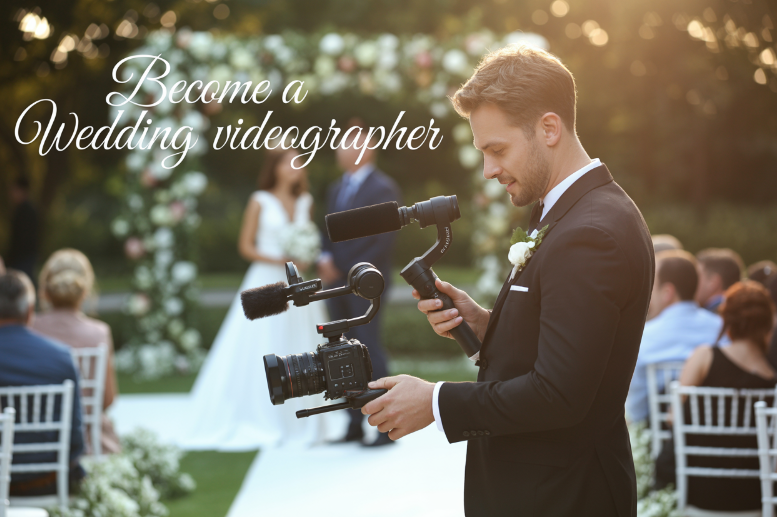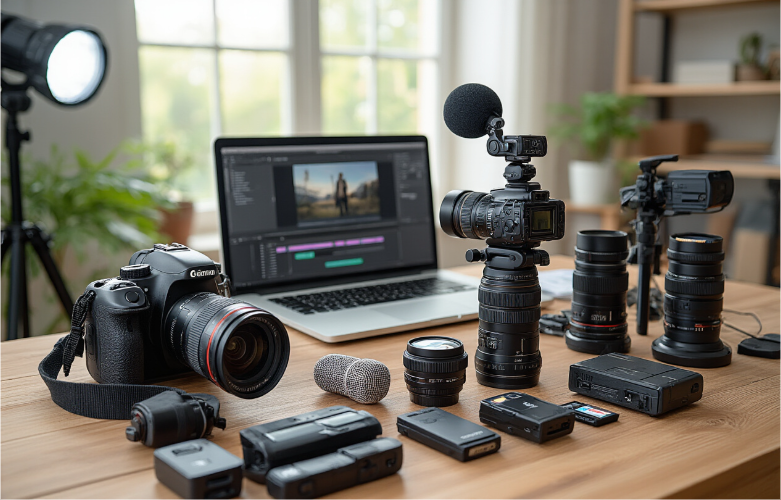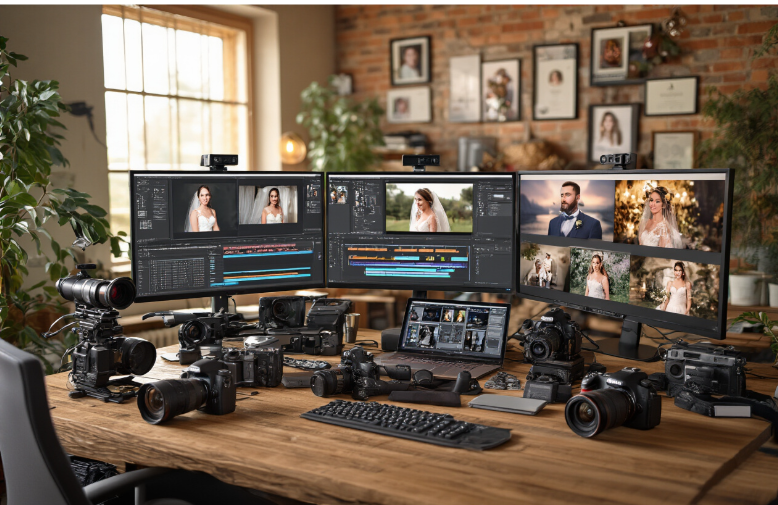Is it hard to become a wedding videographer?
Summary
Becoming a wedding videographer isn’t as hard as it seems it just requires dedication, creative storytelling, and the right tools. With proper training, consistent practice, and a strong portfolio, anyone can enter this rewarding and creative field.
Platforms like MediaZilla simplify the journey by helping filmmakers deliver, present, and monetize their wedding films professionally and effortlessly.
Introduction
Wondering if becoming a wedding videographer is as tough as it sounds? This guide covers everything you need to start your journey in this creative field, from mastering essential skills and choosing the right equipment to exploring training options that fit your budget.
You’ll also learn how to build your portfolio, attract your first clients, and handle common challenges while understanding the real financial investment behind launching a successful wedding videography career.
What Essential Skills and Equipment Do You Need to Start Wedding Videography?
Master Camera Operation and Video Shooting Techniques
- Know your camera thoroughly and understand every setting.
- Learn manual controls like aperture, shutter speed, and ISO.
- Practice shooting in different lighting conditions, such as outdoor and indoor setups.
- Use frame rates wisely: 24 fps for a cinematic look and 60 fps for slow-motion shots.
- Improve movement techniques such as handheld stabilization, smooth panning, and positioning.
Learn professional video editing software
- Use professional editing software such as Adobe Premiere Pro, Final Cut Pro, or DaVinci Resolve.
- Premiere Pro works well with Adobe tools, Final Cut Pro is great for Mac, and DaVinci Resolve excels in color grading.
- Learn color correction and grading to keep whites pure, skin tones natural, and lighting romantic.
- Match footage from different cameras and lighting setups for visual consistency.
- Give equal focus to audio editing, cleaning background noise, syncing multiple audio sources, and balancing music with dialogue.
Develop storytelling and creative composition abilities
- Wedding videography is about telling a love story, not just filming events.
- Understand narrative flow from preparation to celebration to create emotional impact.
- Highlight each couple’s unique personalities and moments in the film.
- Learn composition techniques like the rule of thirds, leading lines, and depth of field.
- Use venue details and natural light creatively to enhance visual beauty.
- Develop anticipation skills to capture genuine emotions and reactions in real time.
Invest in quality cameras, lenses, and audio equipment
Professional wedding videography equipment requires significant investment, but quality gear directly impacts your results and reputation. Full-frame cameras like the Sony A7S III, Canon R6, or Panasonic GH5 offer excellent low-light performance and professional features that wedding work demands.
Audio equipment often gets overlooked but remains critical for wedding videography success. Wireless lavalier microphones for ceremony audio, shotgun mics for reception speeches, and backup recording devices ensure you capture clear audio throughout the day. Poor audio quality ruins otherwise perfect footage.
Backup equipment saves your reputation when primary gear fails. Carrying duplicate cameras, extra batteries, multiple memory cards, and backup audio systems provides security during these irreplaceable events. Many successful wedding videographers follow the "two is one, one is none" philosophy for critical equipment.
What Are the Best Educational Pathways and Training Options for Becoming a Wedding Videographer?
Choose between formal film school and self-taught approaches
You can become a wedding videographer through film school or by being self-taught. Film schools offer structured learning, professional networking, and in-depth filmmaking knowledge but require high costs ($30,000–$100,000) and often cover general filmmaking rather than weddings.
The self-taught route is more flexible and affordable through YouTube, online courses, and practice, allowing you to focus directly on wedding videography and start earning sooner.
The self-taught route requires exceptional self-discipline and motivation. Without structured deadlines or instructor feedback, some people struggle to maintain consistent progress. You'll also miss out on the comprehensive theoretical foundation that formal education provides.
Complete specialized wedding videography courses and workshops
Practice through internships and assisting experienced videographers
- Working with experienced videographers helps you learn real-world skills and workflows faster.
- Reach out to local professionals during busy wedding seasons for assistant opportunities.
- Assistant roles may include second camera work, equipment setup, and backup footage management.
- Learn venue navigation, vendor collaboration, and handling unexpected issues like weather or delays.
- Gain insight into client communication and professional etiquette.
- Internships often lead to referrals, paid opportunities, or long-term collaboration.
How Can You Build Your Portfolio and Client Base as a Wedding Videographer?
Create stunning demo reels that showcase your unique style
- The demo reel is the first impression and most important marketing tool for a videographer.
- Select only the best and most emotional footage that captures genuine moments.
- Keep the reel short and engaging, ideally between 90 seconds and 2 minutes.
- Arrange the clips like a story with a clear beginning, middle, and end.
- Maintain a consistent editing style that represents your creativity and brand.
- Focus on originality and avoid copying others’ styles.
Network with wedding vendors and venue coordinators
- Build relationships with other wedding professionals to create a strong referral network.
- Connect with planners, photographers, florists, and coordinators who regularly work with couples.
- Attend local wedding shows and meetups to introduce yourself and showcase your work.
- Focus on genuine relationships rather than aggressive promotion.
- Collaborate with venue coordinators and offer promotional videos in exchange for referrals.
- Create vendor appreciation reels that highlight their work and build goodwill.
- Helping other vendors shine increases your chances of being recommended to future clients.
Leverage social media marketing to attract couples
- Use social media platforms like Instagram and TikTok to showcase your work and personality.
- Post consistently with high-quality content rather than frequent low-quality posts.
- Share behind-the-scenes clips, wedding highlights, and storytelling captions.
- Create engaging Reels or TikToks using trending sounds and relevant hashtags.
- Interact genuinely with followers and other vendors by commenting, sharing, and replying promptly.
- Collaborate with real couples for styled shoots or engagement videos to create new content and build trust.
Offer competitive pricing strategies for new videographers
- Research your local market to understand standard pricing and client expectations.
- Start with simple three-tier packages: basic, mid-level, and premium options.
- Offer discounts for weekday or off-season weddings to gain experience and testimonials.
- Add extra value with services like online galleries, teaser videos, or planning consultations.
- Be honest about your experience level, but focus on the quality and personal care you provide.
- Emphasize value and professionalism instead of lowering your prices to compete.
How Can You Overcome Common Challenges in the Wedding Videography Industry?
Handle High-Pressure Wedding Day Situations with Confidence
Wedding days are full of emotions and pressure where a calm, confident videographer makes all the difference. Detailed shot lists and clear timelines keep your workflow steady even in chaos. Early communication with photographers and coordinators prevents last-minute confusion. Always carry backup cameras, batteries, and audio gear for emergencies. Start with smaller weddings to build confidence and gain real experience. Every wedding teaches something new and helps you handle pressure better. Stay calm, professional, and prepared that’s the key to success.
Manage Difficult Lighting Conditions and Unpredictable Weather
Lighting and weather truly test a videographer’s skill and adaptability. Master manual exposure to handle mixed indoor lighting like chandeliers and window light. Use low-light capable cameras and portable LED panels for outdoor shoots. Reflectors help soften shadows when sunlight is harsh or clouds are heavy. Keep rain covers, lens cloths, and warmers to protect gear and performance. Always scout indoor backup locations for outdoor weddings. Whatever the weather, your preparation ensures professional-quality footage.
Ensure Best Editing and Delivery Experience
Great films need both powerful editing and professional delivery to impress clients. Master tools like DaVinci Resolve, Premiere Pro, and Final Cut Pro for cinematic visuals. Apply expert color grading, sound design, and motion graphics for premium output. Maintain efficient workflows to deliver projects faster and with higher quality. Remember, great editing deserves equally great delivery to complete the story. Use a professional platform that ensures secure, stunning client experiences. Best editing and best delivery together define your brand’s true excellence.
What Is the Financial Investment and Earning Potential in Wedding Videography?
Calculate startup costs for equipment and business setup
Getting into the wedding videography business requires a significant upfront investment, but understanding exactly what you need helps you budget smartly. Your essential gear includes a professional camera body ($2,000-$5,000), multiple lenses for different shots ($1,500-$3,000), audio equipment like wireless microphones and recorders ($800-$1,500), and stabilization tools such as gimbals or tripods ($500-$1,200).
Don't forget about backup equipment. Weddings happen once, so having a second camera and extra batteries is non-negotiable. Computer hardware for editing demands serious processing power, with a capable editing workstation costing $2,000-$4,000. Professional editing software subscriptions run $20-$80 monthly.
Business setup costs add another layer of expenses. Business registration, insurance policies specifically covering wedding events, website development, and marketing materials can total $2,000-$4,000 initially. Many successful wedding videographers start with a total investment of $10,000-$20,000 to establish a professional foundation.
Set competitive rates that reflect your skill level
- Balance your pricing with your skill level and market standards.
- Beginners usually charge $1,200–$2,500, while professionals earn $3,500–$8,000+.
- Offer package tiers such as basic, mid, and premium with different services and coverage levels.
- Research your local market to understand area-specific pricing trends.
- Consider total time spent, including shooting, editing, and consultations, when setting rates.
- Ensure your rates reflect the value and professionalism you provide, not just experience.
Understand seasonal income fluctuations in the wedding industry
- Wedding videography income peaks between May and October, especially in June, September, and October.
- Winter months (January–March) bring fewer bookings and lower income.
- Most videographers earn 60–70% of their annual income during the busy season.
- Manage finances by saving during peak months to cover off-season expenses.
- Offer discounts for off-season weddings to maintain steady cash flow.
- Income patterns vary by geographic location and weather conditions.
Explore additional revenue streams beyond wedding videography
- Add related services like engagement shoots, anniversary videos, and family films.
- Take on corporate video projects for year-round, steady income.
- Earn passive income through teaching, online courses, or selling presets.
- Rent out equipment such as lenses or lighting gear during downtime.
- Build partnerships with wedding planners, photographers, and venues for referral income.
- Diversifying income ensures stability and business growth throughout the year.
Conclusion
Breaking into wedding videography isn't as daunting as it might seem at first glance. While you'll need to master both technical skills and creative storytelling, plus invest in quality equipment, the learning curve becomes manageable when you take it step by step. You can choose your own educational path, whether that's formal training, online courses, or learning through hands-on experience. Building your portfolio might start with free or low-cost shoots for friends and family, but each project gets you closer to establishing your reputation in the industry.
The financial side requires careful planning since startup costs can add up quickly, but wedding videography offers solid earning potential once you establish yourself. Yes, you'll face challenges like demanding clients, unpredictable wedding day scenarios, and intense competition, but these obstacles aren't impossible to overcome with the right preparation and mindset. If you're passionate about capturing love stories and don't mind putting in the work to develop your skills, wedding videography can become a rewarding career that combines creativity with good income potential.







